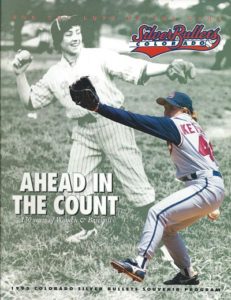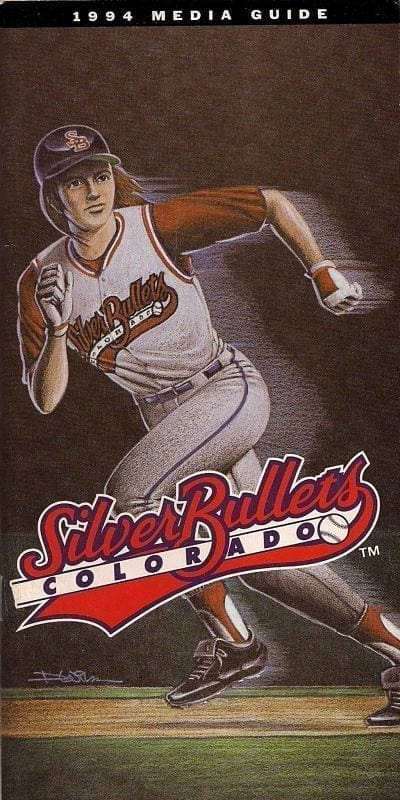Independent/Barnstorming Team (1994-1997)
Tombstone
Born: 1994
Folded: April 1998
First Game: May 8, 1994 (L 19-0 vs. Northern League All-Stars @ Fort Mill, SC)
Last Game: August 24, 1997 (W 5-3 vs. State Farm Machine @ Albany, GA)
Stadia
1994-1996: Barnstorming
1997: Paul Eames Sports Complex + Barnstorming
Branding
Team Colors:
Ownership
Owners:
- 1994: Whittle Communications (Bob Hope & Paul Beckham)
- 1995-1997: Hope-Beckham, Inc. (Bob Hope & Paul Beckham)
Background
The Colorado Silver Bullets were a barnstorming women’s professional baseball team that drew major media attention and big crowds for their battle-of-the-sexes games during the mid-1990’s. The team was the brainchild of veteran sports promoters Bob Hope, a former Atlanta Braves executive, and Paul Beckham, who managed the Goodwill Games, Ted Turner’s attempt to rival the Olympic Games.
Hope and Beckham lined up some heavy hitter support behind their women’s baseball promotion. Coors Brewing Company ponied up a reported $2.5 million to sponsor the team’s debut season of 50 games during the summer of 1994. The team drew its name from Coors Light’s long-time Silver Bullet brand identity. The team had no other genuine connection to the state of Colorado. It’s true power base would always be in and around Atlanta, Georgia where Hope and Beckham rose through the ranks of Ted Turner’s sports properties.
An impressive roster of celebrities and baseball executive lined up to serve on the Silver Bullets’ advisory board. Members included Hank Aaron, Billie Jean King, Joe Morgan, Donna Lopiano and Mike Moore, the president of the National Association of Professional Baseball Leagues (NAPBL). Remarkably, Hope and Beckham secured sanctioning from the NAPBL for the Silver Bullets prior to the team’s debut season, formally recognizing the team as a member of America’s minor league baseball system. It was a designation denied to the emerging men’s independent professional baseball leagues that sprouted up during the early 1990’s.
1994 Debut Season
300-game winner Phil Niekro, a mainstay of Ted Turner’s Atlanta Braves squads of the 1980’s, signed on as Field Manager. His brother Joe Niekro, also a former Major League ace, served as pitching coach.
The Silver Bullets cobbled together a roster from more than 1,300 women who tried out at camps all across the country in the late winter and early spring of 1994. The two dozen or so women who made the final cut would earn $20,000 each for the 1994 season. The pay was substantially higher than most male minor leaguers earned at the time.
 The team made its debut on Mother’s Day 1994 at a minor league stadium in Fort Mill, South Carolina. Their opponents were an All-Star team from the independent Northern League. Former Boston Red Sox pitcher Oil Can Boyd, who started Game 3 of the 1986 World Series, pitched for the Northern Leaguers. The debut was a rough one. The Silver Bullets lost 19-0, managing only two singles while striking out 16 times. After the game, Phil Niekro called off remaining games against men’s professional teams and announced the Silver Bullets would focus on semi-pro and collegiate opposition for the rest of 1994.
The team made its debut on Mother’s Day 1994 at a minor league stadium in Fort Mill, South Carolina. Their opponents were an All-Star team from the independent Northern League. Former Boston Red Sox pitcher Oil Can Boyd, who started Game 3 of the 1986 World Series, pitched for the Northern Leaguers. The debut was a rough one. The Silver Bullets lost 19-0, managing only two singles while striking out 16 times. After the game, Phil Niekro called off remaining games against men’s professional teams and announced the Silver Bullets would focus on semi-pro and collegiate opposition for the rest of 1994.
The Silver Bullets remained over-matched for the rest of the summer. The team finished with a 6-37 record and hit just .141 as a team with a 7.09 ERA. But the team still drew big crowds. A May 15, 1994 exhibition against the Northern California Junior College All-Stars drew 42,082 to San Francisco’s Candlestick Park.
Better Every Year
The team would steadily improve over the next several summers. 11-33 in 1995. 18-34 in 1996. And, at last, a winning 23-22 season in 1997. During the team’s third season in 1996, outfielder Kim Braatz-Voisard became the first Silver Bullet to hit an out-of-the-park home run during an exhibition in Orleans, Massachusetts. In June 1997, Braatz-Voisard charged the mound after getting beaned, setting off a bench-clearing brawl against a team of teenage boys in Georgia.
The Silver Bullets played to huge crowds in historic ballparks such as Candlestick Park, Fenway Park and Coors Field in Denver. They also played countless small towns and minor league band boxes around the United States. They attracted more than a million fans and saw dozens of games broadcast on cable television during their four season run.
Coors pulled their sponsorship after four seasons in late 1997. Unable to secure a new sponsor to replace the brewing giant, the Silver Bullets folded in early 1998.
The Bullets overall record for their four season run was 58-125.1NO BYLINE. “Silver Bullets post win, finish season with winning record”. The Advertiser (Montgomery, AL). August 25, 1997
Colorado Silver Bullets Shop
[auction-nudge tool=”listings”]
Silver Bullets Video
Downloads
1995 Colorado Silver Bullets Schedule
##


10 Responses
I was at the ’94 game in Ft. Mill.
It was televised on ESPN2, and we’d taped it as well. I watched it a few years ago. They were down something like 12-0 after 3 innings (Leon Durham memorably hit a ball to Mars), and I remember wondering “How did the Silver Bullets ever get 27 outs while they were in the field?”
The SBs had some pretty unrealistic expectations to start with – but they did improve during their 4 seasons.
Have there been any other barnstorming teams (male or female) since the Silver Bullets?
I guess you could count the current Savannah Bananas (i.e. the wannabe baseball Globetrotters).
Any silver bullets programs media guides card sets
I have a 1997 yearbook from the silver bullets if you are interested
I would be interested.
I have signed bb#14 catcher
I have a nine card silver bullets stand up card holder with eight players and Niekro mounted inside. Not sure which year it was from.
I found a team autograph baseball in a antique store in Indiana and with a little research of some of the names, it looks like it it was autographed by the Colorado Silver Bullets team. If you would like it, send me an email for where to send it to. Thanks!
Do you still have that ball?